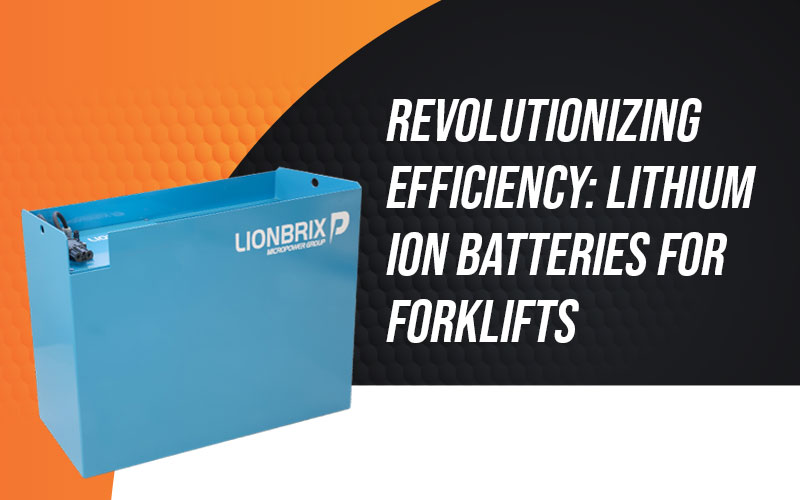Revolutionizing Efficiency with Lithium Ion Batteries for Forklifts
29 Sep 2023

In recent years, technological advancements have brought about transformative changes in the world of materials handling equipment. One of the most significant developments has been the adoption of lithium-ion batteries in forklifts. The transition from traditional lead-acid batteries to lithium-ion forklift batteries has not only improved efficiency but has also paved the way for a greener and more sustainable future. In this blog post, we will delve into the world of lithium-ion forklift batteries, exploring their benefits, applications, and the role they play in shaping the material handling industry.
The Rise of Lithium-Ion Batteries
Lithium-ion batteries have become a ubiquitous presence in our lives, powering everything from smartphones to electric vehicles. Their high energy density, long cycle life, and relatively low maintenance requirements have made them the preferred choice in various industries. Now, these advantages are being harnessed to revolutionize the material handling sector, specifically in the form of lithium-ion forklift batteries.
Benefits of Lithium-Ion Forklift Batteries
- Longer Lifespan: Lithium-ion forklift batteries have a significantly longer lifespan compared to traditional lead-acid batteries. While lead-acid batteries may require replacement every 3-5 years, lithium-ion batteries can last up to 10 years or more. This longevity translates to reduced maintenance costs and increased productivity.
- Quick Charging: Lithium-ion batteries can be charged quickly, often in a fraction of the time it takes to charge a lead-acid battery. This means less downtime for forklifts, leading to improved efficiency in material handling operations.
- Energy Efficiency: Lithium-ion forklift batteries offer superior energy efficiency. They maintain a consistent voltage throughout the discharge cycle, ensuring that the forklift operates at peak performance until the battery is depleted.
- Reduced Maintenance: Traditional lead-acid batteries require regular watering, equalizing, and cleaning to maintain their performance. In contrast, lithium-ion batteries are virtually maintenance-free, reducing the need for labour and materials.
- Space-Saving Design: Lithium-ion batteries are compact and lightweight compared to lead-acid batteries, allowing forklifts to have a smaller footprint and improved maneuverability in tight spaces.
Applications of Lithium-Ion Forklift Batteries
- Warehousing: Lithium-ion forklift batteries are widely used in warehouses and distribution centers. Their quick charging capabilities and extended lifespan make them ideal for handling the demanding workload of these environments. Forklift operators can work longer shifts without the need for frequent battery changes.
- Manufacturing: Manufacturers often rely on forklifts to move materials and components within their facilities. Lithium-ion batteries enhance the efficiency of these operations by reducing downtime and minimizing the need for battery maintenance.
- Retail: In the retail sector, where forklifts are essential for stock management and order fulfillment, lithium-ion batteries ensure that the forklifts are ready for action at all times. This is especially important during peak shopping seasons.
- Ports and Logistics: Ports and logistics companies handle vast quantities of cargo, and efficient material handling is crucial. Lithium-ion forklift batteries are well-suited for these applications due to their ability to sustain high-intensity operations.
- Agriculture: Even in the agricultural sector, lithium-ion forklift batteries have found a place. They are used for tasks like loading and unloading produce, reducing the need for frequent recharging and maintenance.
The Green Revolution: Sustainability and Lithium Forklift Batteries
Beyond their operational advantages, lithium-ion forklift batteries play a vital role in promoting sustainability in the material handling industry. Here's how:
- Reduced Emissions: Lithium-ion batteries produce zero emissions during operation. This means cleaner air within warehouses and reduced environmental impact, making them a greener choice for businesses.
- Longer Lifespan: The extended lifespan of lithium-ion batteries means fewer batteries end up in landfills, reducing the environmental footprint associated with battery disposal.
- Energy Efficiency: Lithium-ion batteries are more energy-efficient, which reduces the overall electricity consumption in material handling operations, contributing to energy conservation.
- Renewable Energy Integration: Lithium-ion batteries can be charged using electricity from renewable sources, such as solar or wind power, further decreasing the carbon footprint of material handling equipment.
Conclusion
The transition to lithium-ion forklift batteries is a transformative step in the material handling industry. Their numerous benefits, including longer lifespan, quick charging, energy efficiency, and reduced maintenance, make them a smart choice for businesses seeking to improve productivity and reduce operating costs. Furthermore, the sustainability factor cannot be overstated. Lithium-ion forklift batteries are a key player in reducing emissions, conserving energy, and promoting environmentally responsible practices in the workplace. As technology continues to advance, we can expect even more innovations in lithium-ion battery technology, further enhancing the capabilities of forklifts and other material handling equipment. The future of the material handling industry is undoubtedly greener, more efficient, and powered by lithium-ion batteries. Get in touch with the Forkman for lithium ion battery latest technologies in South Africa today.
